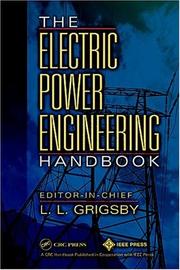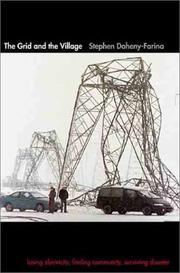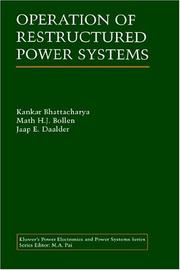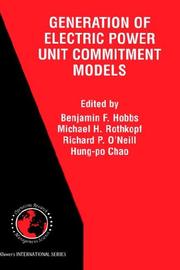| Listing 1 - 5 of 5 |
Sort by
|

ISBN: 0849385784 Year: 2001 Publisher: Boca Raton : CRC Press,
Abstract | Keywords | Export | Availability | Bookmark
 Loading...
Loading...Choose an application
- Reference Manager
- EndNote
- RefWorks (Direct export to RefWorks)
Electric power production. --- Electricité --- Production --- 621.315 --- Electric power production --- #TELE:ELEN --- Electric power generation --- Electricity generation --- Power production, Electric --- Electric power systems --- Electrification --- Transmission of electric energy. Power distribution and telecommunication lines. Conductors. Insulating materials. Accessories. Design, construction of lines --- 621.315 Transmission of electric energy. Power distribution and telecommunication lines. Conductors. Insulating materials. Accessories. Design, construction of lines --- Electricité

ISBN: 0852967756 Year: 2001 Volume: 32 Publisher: Stevenage : IEE [Institution of Electrical Engineers],
Abstract | Keywords | Export | Availability | Bookmark
 Loading...
Loading...Choose an application
- Reference Manager
- EndNote
- RefWorks (Direct export to RefWorks)
Electric power distribution --- High voltages --- Electric circuits --- Electricité --- Haute tension --- High tension --- Alternating current --- Distribution --- -High voltages --- 621.3 --- Electromotive force --- Electricity --- Power distribution, Electric --- Electric power systems --- Power transmission --- Electric power transmission --- Electrification --- Electrical engineering --- 621.3 Electrical engineering --- Electricité --- Electric power distribution - high tension

ISBN: 1281722979 9786611722975 0300133820 9780300133820 9781281722973 9780300089776 0300089775 6611722971 Year: 2001 Publisher: New Haven Yale University Press
Abstract | Keywords | Export | Availability | Bookmark
 Loading...
Loading...Choose an application
- Reference Manager
- EndNote
- RefWorks (Direct export to RefWorks)
In January 1998 a massive ice storm descended on New York, New England, and eastern Canada. It crushed power grids from the Great Lakes to the North Atlantic, forcing thousands of people into public shelters and leaving millions of others in their homes without electricity. In this riveting book Stephen Doheny-Farina presents an insider's account of these events, describing the destruction of the electric network in his own village and the emergence of the face-to-face interactions that took its place. His stories examine the impact of electronic communications on community, illuminating the relationship between electronic and human connections and between networks and neighborhoods, and exploring why and how media portrayals of disasters can distort authentic experience. Doheny-Farina begins by discussing the disaster and tracing the origins of the storm. He then goes back two hundred years to tell how this particular electric grid was built, showing us the sacrifices people made to create the grids that (usually) connect us to one another. Today's power grid, says Doheny-Farina, has become more vulnerable than we realize, as demand begins to outstrip capacity in urban centers around the nation. His book reminds us what those grids mean-both positively and negatively-to our electronically saturated lives.
Electric power distribution --- Electric power failures --- Ice storms --- Icestorms --- Winter storms --- Blackouts, Electric power --- Electric power --- Electric power interruptions --- Electric power outages --- Outages, Electric power --- Power blackouts --- Power failures --- Power outages, Electric --- System failures (Engineering) --- Brownouts --- Electricity --- Power distribution, Electric --- Electric power systems --- Power transmission --- Electric power transmission --- Electrification --- Cold weather conditions. --- Social aspects --- History. --- Interruptions --- Distribution --- Potsdam Region (N.Y.) --- Social life and customs --- Electric power distribution -- New York (State) -- Cold weather conditions.. --- Electric power failures -- Social aspects -- New York (State) -- Potsdam Region -- Case studies.. --- Ice storms -- New York (State) -- Saint Lawrence County -- History.. --- Potsdam Region (N.Y.) -- Social life and customs -- 20th century.

ISBN: 0792373979 1461355672 1461514657 Year: 2001 Publisher: Boston Kluwer Academic
Abstract | Keywords | Export | Availability | Bookmark
 Loading...
Loading...Choose an application
- Reference Manager
- EndNote
- RefWorks (Direct export to RefWorks)
Deregulation is a fairly new paradigm in the electric power industry. And just as in the case of other industries where it has been introduced, the goal of deregulation is to enhance competition and bring consumers new choices and economic benefits. The process has, obviously, necessitated reformulation of established models of power system operation and control activities. Similarly, issues such as system reliability, control, security and power quality in this new environment have come in for scrutiny and debate. In this book, we attempt to present a comprehensive overview of the deregulation process that has developed till now, focussing on the operation aspects. As of now, restructured electricity markets have been established in various degrees and forms in many countries. This book comes at a time when the deregulation process is poised to undergo further rapid advancements. It is envisaged that the reader will benefit by way of an enhanced understanding of power system operations in the conventional vertically integrated environment vis-a-vis the deregulated environment. The book is aimed at a wide range of audience- electric utility personnel involved in scheduling, dispatch, grid operations and related activities, personnel involved in energy trading businesses and electricity markets, institutions involved in energy sector financing. Power engineers, energy economists, researchers in utilities and universities should find the treatment of mathematical models as well as emphasis on recent research work helpful.
Electric power production. --- Electric utilities --- Electricité --- Services publics d'électricité --- Deregulation. --- Production --- Déréglementation --- 338 --- Electric power production --- -Electric companies --- Electric light and power industry --- Electric power industry --- Electric industries --- Energy industries --- Public utilities --- Electric power generation --- Electricity generation --- Power production, Electric --- Electric power systems --- Electrification --- Economische situatie. Economische structuur van bepaalde landen en gebieden. Economische geografie. Economische produktie.economische produkten. Economische diensten --- Deregulation --- -Economische situatie. Economische structuur van bepaalde landen en gebieden. Economische geografie. Economische produktie.economische produkten. Economische diensten --- 338 Economische situatie. Economische structuur van bepaalde landen en gebieden. Economische geografie. Economische produktie.economische produkten. Economische diensten --- -Electric power generation --- Electric companies --- Electricité --- Services publics d'électricité --- Déréglementation --- Electrical engineering. --- Energy policy. --- Energy and state. --- Energy systems. --- Electrical Engineering. --- Energy Policy, Economics and Management. --- Energy Systems. --- Energy and state --- Power resources --- State and energy --- Industrial policy --- Energy conservation --- Electric engineering --- Engineering --- Government policy

ISBN: 0792373340 9786610201471 1280201479 0306476630 9780792373346 Year: 2001 Publisher: Dordrecht, Netherlands : Kluwer Academic Publishers,
Abstract | Keywords | Export | Availability | Bookmark
 Loading...
Loading...Choose an application
- Reference Manager
- EndNote
- RefWorks (Direct export to RefWorks)
Over the years, the electric power industry has been using optimization methods to help them solve the unit commitment problem. The result has been savings of tens and perhaps hundreds of millions of dollars in fuel costs. Things are changing, however. Optimization technology is improving, and the industry is undergoing radical restructuring. Consequently, the role of commitment models is changing, and the value of the improved solutions that better algorithms might yield is increasing. The dual purpose of this book is to explore the technology and needs of the next generation of computer models for aiding unit commitment decisions. Because of the unit commitment problem's size and complexity and because of the large economic benefits that could result from its improved solution, considerable attention has been devoted to algorithm development in the book. More systematic procedures based on a variety of widely researched algorithms have been proposed and tested. These techniques have included dynamic programming, branch-and-bound mixed integer programming (MIP), linear and network programming approaches, and Benders decomposition methods, among others. Recently, metaheuristic methods have been tested, such as genetic programming and simulated annealing, along with expert systems and neural networks. Because electric markets are changing rapidly, how UC models are solved and what purposes they serve need reconsideration. Hence, the book brings together people who understand the problem and people who know what improvements in algorithms are really possible. The two-fold result in The Next Generation of Electric Power Unit Commitment Models is an assessment of industry needs and new formulations and computational approaches that promise to make unit commitment models more responsive to those needs.
Electric power consumption --- Electric power production --- Electric power --- Forecasting --- Mathematical models --- Decision making --- Purchasing --- EPUB-LIV-FT SPRINGER-B --- Economics. --- Environmental management. --- Environmental economics. --- Environmental protection. --- Operations research. --- Economics, general. --- Environmental Management. --- Energy Policy, Economics and Management. --- Environmental Economics. --- Atmospheric Protection/Air Quality Control/Air Pollution. --- Operations Research/Decision Theory. --- Mathematical models. --- Management science. --- Energy policy. --- Energy and state. --- Air pollution. --- Decision making. --- Deciding --- Decision (Psychology) --- Decision analysis --- Decision processes --- Making decisions --- Management --- Management decisions --- Choice (Psychology) --- Problem solving --- Operational analysis --- Operational research --- Industrial engineering --- Management science --- Research --- System theory --- Air --- Air contaminants --- Air pollutants --- Air pollution --- Air pollution control --- Air toxics --- Airborne pollutants --- Atmosphere --- Contaminants, Air --- Control of air pollution --- Pollutants, Air --- Toxics, Air --- Pollution --- Air quality --- Atmospheric deposition --- Economics --- Environmental quality --- Energy and state --- Power resources --- State and energy --- Industrial policy --- Energy conservation --- Environmental stewardship --- Stewardship, Environmental --- Environmental sciences --- Quantitative business analysis --- Operations research --- Statistical decision --- Economic theory --- Political economy --- Social sciences --- Economic man --- Control --- Environmental aspects --- Economic aspects --- Government policy --- Consumption of electric power --- Electricity --- Electric utilities --- Energy consumption --- Demand-side management (Electric utilities) --- Electric power generation --- Electricity generation --- Power production, Electric --- Electric power systems --- Electrification --- Electric power supply --- Power supply, Electric --- Consumption --- Electric power consumption - Forecasting - Mathematical models - Congresses --- Electric power production - Decision making - Mathematical models - Congresses --- Electric power - Purchasing - Decision making - Mathematical models - Congresses
| Listing 1 - 5 of 5 |
Sort by
|

 Search
Search Feedback
Feedback About UniCat
About UniCat  Help
Help News
News